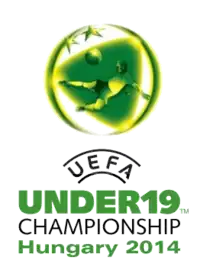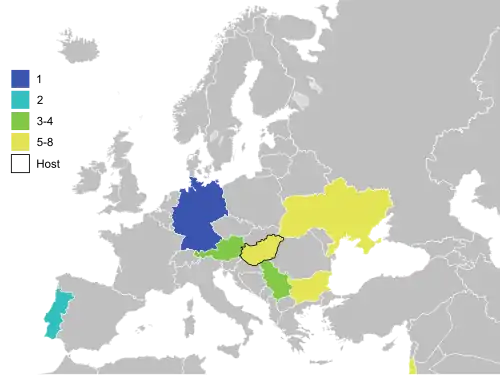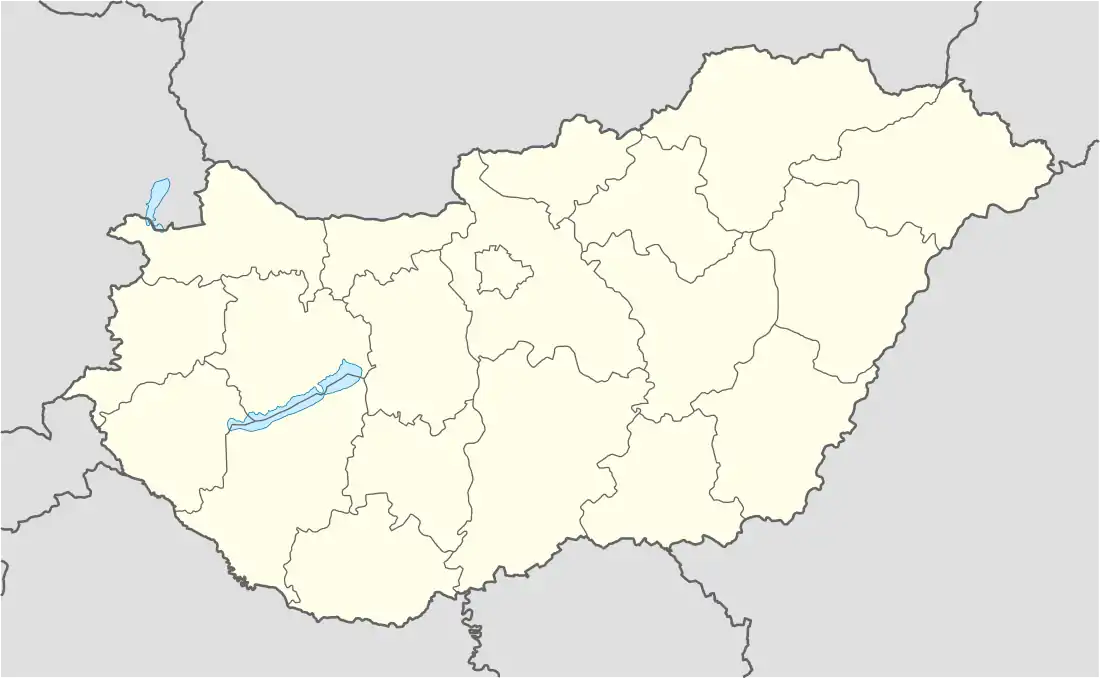2014 UEFA European Under-19 Championship
The 2014 UEFA European Under-19 Championship was the 13th edition of the UEFA European Under-19 Championship since its reclassification from an under-18 event in 2002, and the 63rd since the tournament was created in 1948. Hungary was chosen to host the final tournament,[2] which was staged from 19 to 31 July 2014 in four cities – Budapest, Felcsút, Győr and Pápa. It was the second time (first in the under-19 era) that the country held this tournament, having previously hosted it in 1990.[3] Players born after 1 January 1995 were eligible to participate in this competition.
| 2014-es U19-es labdarúgó-Európa-bajnokság | |
|---|---|
 | |
| Tournament details | |
| Host country | |
| Dates | 19–31 July |
| Teams | 8 (from 1 confederation) |
| Venue(s) | 4 (in 4 host cities) |
| Final positions | |
| Champions | |
| Runners-up | |
| Tournament statistics | |
| Matches played | 15 |
| Goals scored | 41 (2.73 per match) |
| Attendance | 32,106 (2,140 per match) |
| Top scorer(s) | (6 goals) |
| Best player(s) | |
Qualification matches began in September 2013 and concluded in June 2014, with seven teams joining the hosts in the final tournament. Among them were the defending champions, Serbia, who defeated France 1–0 in the previous final to secure their first-ever title in UEFA competitions.
The best three teams from each group at the final tournament qualified for the 2015 FIFA U-20 World Cup in New Zealand.[3]
Germany defeated Portugal 1–0 in the final to capture their third title.[4]
Venues
The final tournament matches were held in four stadium venues located in four cities:[3]
| Stadium | Location | Capacity | Matches | Ref |
|---|---|---|---|---|
| Ferenc Szusza Stadium | Budapest | 12,700 | 3 group stage matches, 1 semi-final and final | [5] |
| Pancho Arena | Felcsút | 3,672 | 3 group stage matches and 1 semi-final | [6] |
| ETO Park | Győr | 13,772 | 3 group stage matches | [7] |
| Perutz Stadion | Pápa | 3,118 | 3 group stage matches | [8] |
Qualification
Qualification for the final tournament occurred in two phases: a qualifying round and an elite round. During these rounds, 53 national teams competed to determine the seven teams that would join the automatically qualified host team, Hungary.[9]
The qualifying round was played between 6 September and 19 November 2013, following a draw that took place on 5 December 2012 at the UEFA headquarters in Nyon, Switzerland. According to the UEFA under-19 national team coefficient ranking,[10] the top seeded team, Spain, was given a bye to the elite round, whereas the remaining 52 teams were divided into two pots and drawn into 13 groups of four teams. Each group included two teams from both pots and was contested as a round-robin tournament, hosted by one of the group teams. The group winners and runners-up, along with the best third-placed team, qualified for the next round.[9]
The elite round was played between 24 May and 10 June 2014 and was contested by the 27 teams advancing from the qualifying round plus Spain. The draw took place on 28 November 2013 at the UEFA headquarters and allocated the 28 teams – previously arranged into four seeding pots according to their qualifying round coefficient (Spain were automatically seeded in the first pot) – into seven groups of four. Each group was contested similarly to the qualifying round, with the seven group winners securing qualification for the final tournament.[11]
Qualified teams
The following eight teams qualified for the final tournament:[12]
| Country | Qualified as | Previous appearances in tournament1 |
|---|---|---|
| Hosts | 1 (2008) | |
| Group 1 winner | 2 (2004, 2009) | |
| Group 2 winner | 1 (2008) | |
| Group 3 winner | 0 (debut) | |
| Group 4 winner | 6 (20052, 2007, 2009, 2011, 2012, 2013) | |
| Group 5 winner | 5 (2002, 2004, 2005, 2007, 2008) | |
| Group 6 winner | 4 (2003, 2006, 2007, 2010) | |
| Group 7 winner | 6 (2003, 2006, 2007, 2010, 2012, 2013) |
- 1 Only counted appearances for under-19 era (bold indicates champion for that year, while italic indicates hosts)
Squads
Match officials
UEFA named six referees and eight assistant referees to officiate matches at the final tournament. Additionally, two referees from the host nation were chosen as fourth officials.[13]
|
|
|
Group stage

The draw for the group stage was held on 19 June 2014 at the Pancho Arena in Felcsút, and was conducted by the UEFA Youth and Amateur Football Committee chairman, Jim Boyce, who was assisted by former Hungarian national team coach and final tournament ambassador Kálmán Mészöly.[14]
The eight finalists were drawn into two groups of four teams (as hosts, Hungary were seeded in group A), where they played matches against each other in a round-robin system. The top two teams from each group advanced to the semi-finals.[12]
- Tie-breaking
If two or more teams were equal on points on completion of the group matches, the following tie-breaking criteria were applied:[15]
- Higher number of points obtained in the matches played between the teams in question;
- Superior goal difference resulting from the matches played between the teams in question;
- Higher number of goals scored in the matches played between the teams in question;
If, after having applied criteria 1 to 3, teams still had an equal ranking, criteria 1 to 3 were reapplied exclusively to the matches between the teams in question to determine their final rankings. If this procedure did not lead to a decision, criteria 4 to 7 were applied.
- Superior goal difference in all group matches;
- Higher number of goals scored in all group matches;
- Respect Fair play ranking of the teams in question (final tournament);
- Drawing of lots.
If only two teams were tied (according to criteria 1–7) after having met in the last match of the group stage, their ranking would be determined by a penalty shoot-out.
All times are in Central European Summer Time (UTC+02:00).[16]
Group A
| Pos | Team | Pld | W | D | L | GF | GA | GD | Pts | Qualification |
|---|---|---|---|---|---|---|---|---|---|---|
| 1 | 3 | 3 | 0 | 0 | 11 | 2 | +9 | 9 | Knockout stage and 2015 FIFA U-20 World Cup | |
| 2 | 3 | 2 | 0 | 1 | 7 | 3 | +4 | 6 | ||
| 3 | 3 | 1 | 0 | 2 | 4 | 10 | −6 | 3 | 2015 FIFA U-20 World Cup | |
| 4 | 3 | 0 | 0 | 3 | 1 | 8 | −7 | 0 |
(H) Hosts
| Austria | 1–2 | |
|---|---|---|
| Grillitsch |
Report | Podstawski Baldé |
Group B
| Pos | Team | Pld | W | D | L | GF | GA | GD | Pts | Qualification |
|---|---|---|---|---|---|---|---|---|---|---|
| 1 | 3 | 2 | 1 | 0 | 7 | 2 | +5 | 7 | Knockout stage and 2015 FIFA U-20 World Cup | |
| 2 | 3 | 1 | 2 | 0 | 4 | 3 | +1 | 5 | ||
| 3 | 3 | 1 | 1 | 1 | 2 | 3 | −1 | 4 | 2015 FIFA U-20 World Cup | |
| 4 | 3 | 0 | 0 | 3 | 0 | 5 | −5 | 0 |
| Ukraine | 1–1 | |
|---|---|---|
| Burda |
Report | Maksimović |
| Bulgaria | 0–1 | |
|---|---|---|
| Report | Tankovskyi |
Knockout stage
In the knockout stage, extra time and penalty shoot-out are used to decide the winner if necessary.[15]
Bracket
| Semi-finals | Final | |||||
| 28 July | ||||||
| 0 (4) | ||||||
| 31 July | ||||||
| 0 (3) | ||||||
| 0 | ||||||
| 28 July | ||||||
| 1 | ||||||
| 4 | ||||||
| 0 | ||||||
Semifinals
Goalscorers
- 6 goals
- 5 goals
- 2 goals
- 1 goal
Team of the tournament
|
|
Source: UEFA Technical Report[17]
Golden player: ![]() Davie Selke[18]
Davie Selke[18]
References
- "UEFA.com Golden Player 2014: Davie Selke". UEFA.com.
- "Germany, Greece and Hungary given U19 finals". UEFA.com (Union of European Football Associations). 20 March 2012. Retrieved 28 May 2014.
- "2014 final tournament: Hungary". UEFA.com. Union of European Football Associations). Retrieved 28 May 2014.
- "Germany edge out Portugal for second U19 crown". UEFA.com. Union of European Football Associations). Retrieved 31 July 2014.
- "Szusza Ferenc Stadion, Budapest". UEFA.com. Union of European Football Associations. Retrieved 19 June 2014.
- "Puskás Akadémia Pancho Aréna, Felcsut". UEFA.com. Union of European Football Associations. Retrieved 19 June 2014.
- "ETO Park Stadion, Gyor". UEFA.com. Union of European Football Associations. Retrieved 19 June 2014.
- "Perutz Stadion, Papa". UEFA.com. Union of European Football Associations. Retrieved 19 June 2014.
- "2013/14 U19 qualifying round draw seedings". UEFA.com. Union of European Football Associations. 30 August 2013. Retrieved 10 June 2014.
- "2013/14 UEFA European Under-17 and Under-19 Championships Qualifying Draws" (PDF). UEFA.com. Union of European Football Associations. Retrieved 10 June 2014.
- "Spain lead U19 elite round seeds". UEFA.com. Union of European Football Associations. 22 November 2013. Retrieved 10 June 2014.
- "Lineup complete for Under-19 finals in Hungary". UEFA.com. Union of European Football Associations. 10 June 2014. Retrieved 10 June 2014.
- "Match officials". UEFA.com. Union of European Football Associations. Retrieved 19 June 2014.
- "Former champions block Serbia's path". UEFA.com. Union of European Football Associations. 19 June 2014. Retrieved 19 June 2014.
- "Regulations of the UEFA European Under-19 Championship 2013/14" (PDF). UEFA.com. Retrieved 19 June 2014.
- "Match schedule" (PDF). UEFA.com. Union of European Football Associations. 26 June 2014. Retrieved 29 June 2014.
- "Team of the Tournament". UEFA. Retrieved 28 July 2016.
- "2014: Davie Selke". UEFA.com. Union of European Football Associations. 1 September 2014. Retrieved 29 June 2015.
